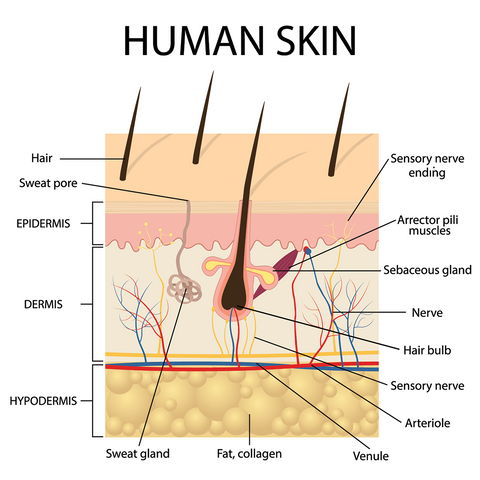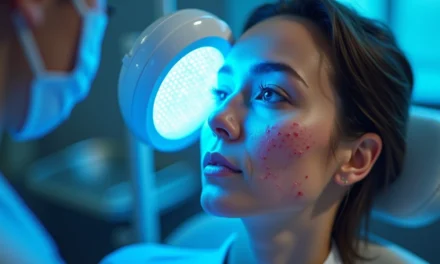Introduction to Body’s biggest Organ
Did you know that the body’s biggest organ isn’t tucked away inside but rather right on the surface? The skin, our body’s largest organ, plays a crucial role in protecting us from the outside world, regulating temperature, and providing the sense of touch. This remarkable organ covers an average of 20 square feet, making it a vital barrier and interface between our internal systems and the external environment.

Structure and Composition:
The skin is composed of three primary layers: the epidermis, the dermis, and the subcutaneous tissue.
1. Epidermis:
The outermost layer, acting as the body’s primary defence barrier. It consists of several sub-layers of cells, including keratinocytes, which produce keratin—a protein that helps waterproof and protect the skin.
2. Dermis:
Situated below the epidermis, this layer houses collagen and elastin fibres, giving the skin its strength and elasticity. The dermis also contains blood vessels, nerve endings, hair follicles, and glands (sweat and sebaceous), which play vital roles in temperature regulation and sensation.
3. Subcutaneous Tissue:
The innermost layer, composed mainly of fat and connective tissue, provides insulation and cushioning for the body.
Functions of the Skin:
The skin performs several essential functions, making it an indispensable part of the body’s physiology.
1. Protection:
The skin acts as a physical barrier against environmental hazards such as pathogens, chemicals, and physical injuries. It also helps prevent excessive water loss, maintaining hydration and homeostasis.
2. Sensation:
Through an extensive network of nerve endings, the skin is responsible for detecting touch, pressure, pain, and temperature. This sensory input is crucial for protecting the body from harm and enabling interaction with the environment.
3. Temperature Regulation:
The skin regulates body temperature through sweat production and the dilation or constriction of blood vessels. This thermoregulation ensures that the body maintains a stable internal temperature, crucial for optimal functioning.
4. Excretion:
Sweat glands in the skin help excrete waste products such as urea and salts, playing a minor yet significant role in the body’s excretory system.
5. Synthesis of Vitamin D:
When exposed to ultraviolet (UV) radiation from the sun, the skin synthesises vitamin D, a vital nutrient for bone health and immune function.
Skin Health and Maintenance:
Given its extensive roles, maintaining skin health is crucial. This involves a combination of proper hygiene, nutrition, and protection from excessive sun exposure.
1. Hygiene:
Regular cleansing helps remove dirt, oil, and dead skin cells, preventing infections and promoting overall skin health.
2. Nutrition:
A balanced diet rich in vitamins (especially A, C, and E), minerals, and antioxidants supports skin repair and regeneration.
3. Sun Protection:
Using sunscreen and wearing protective clothing can prevent damage from UV radiation, which can lead to premature ageing and skin cancer.
Common Skin Conditions:
Despite its robustness, the skin can be affected by various conditions, including:
1. Acne:
Caused by clogged hair follicles and associated inflammation, it is common during adolescence but can persist into adulthood.
2. Eczema:
A group of conditions causing inflamed, itchy, and red skin, often due to an overactive immune response.
3. Psoriasis:
An autoimmune condition characterised.
Advantages of Having the Skin as the Body’s Largest Organ
The skin, being the largest organ of the body, offers several advantages that are crucial for survival and overall health.
Here are some key benefits:
1. Protection:
Barrier Against Pathogens:
The skin acts as a first line of defense against bacteria, viruses, and other harmful microorganisms, preventing infections and diseases.
Physical Shield:
It protects internal organs, muscles, and tissues from physical injuries, such as cuts, bruises, and impacts.
2. Regulation of Body Temperature:
Sweating:
Sweat glands in the skin help cool the body by releasing moisture that evaporates, dissipating heat.
Blood Vessel Control:
The skin’s blood vessels can constrict or dilate to retain or release heat, maintaining an optimal body temperature.
3. Sensory Perception :
Touch and Pressure:
Nerve endings in the skin allow us to sense touch, pressure, and texture, enabling us to interact with and respond to our environment.
Temperature and Pain:
The skin detects temperature changes and pain, helping us avoid injuries and dangerous situations.
4. Vitamin D Synthesis:
Sunlight Exposure:
When exposed to UV rays from the sun, the skin synthesizes vitamin D, which is essential for bone health, immune function, and overall well-being.
5.Water and Electrolyte Balance:
Prevention of Dehydration:
The skin helps prevent excessive water loss from the body, maintaining proper hydration levels.
Excretion of Waste:
Sweat glands excrete small amounts of waste products like urea and salts, aiding in the detoxifix.
As you know, the skin is a very delicate part of our body, and it is essential to protect it.
Here are a few important tips for skin protection in your daily routine.
Skin protection can be achieved through several key practices:
- 1. Use Sunscreen: Applying sunscreen with at least SPF 30 helps protect the skin from harmful UV rays, which can cause sunburn, premature aging, and increase the risk of skin cancer.
- 2. Stay Hydrated: Drinking plenty of water keeps the skin hydrated from within, helping maintain its elasticity and overall health.
- 3. Moisturize Regularly: Using a good moisturizer helps prevent dryness and keeps the skin soft and supple. It’s especially important to moisturize after washing your face or taking a shower.
- 4. Wear Protective Clothing: When spending time outdoors, wearing hats, sunglasses, and clothing that covers your skin can shield it from direct sunlight and other environmental factors like wind and pollution.
- 5. Eat a Healthy Diet: A diet rich in vitamins, minerals, and antioxidants supports skin health. Foods high in vitamin C, E, and omega-3 fatty acids are particularly beneficial.
- 6. Avoid Harsh Chemicals: Use gentle, non-irritating skincare products to avoid damaging the skin’s natural barrier. Avoid excessive use of products with strong fragrances or alcohol.
- 7. Practice Good Hygiene: Regularly cleansing your skin removes dirt, oil, and other impurities that can cause breakouts and infections. However, avoid over-washing, as it can strip the skin of its natural oils.
- 8. Get Enough Sleep: Adequate sleep is essential for skin repair and regeneration. Lack of sleep can lead to dull skin and dark circles under the eyes.By following these practices, you can help protect your skin and keep it healthy, vibrant, and resilient.
To protect your skin, incorporating a diet
To protect your skin, incorporating a diet rich in vegetables, fruits, and plenty of water is essential. Vegetables and fruits are packed with vitamins, antioxidants, and minerals that help repair skin cells, combat free radicals, and promote a healthy glow. For example, vitamin C-rich fruits like oranges and strawberries boost collagen production, while leafy greens like spinach provide vital nutrients for skin elasticity. Drinking enough water hydrates the skin from within, maintaining its moisture balance and helping to flush out toxins that can cause breakouts and dullness. Together, these elements contribute to healthier, more resilient skin.

Highly recommend
It is highly recommended to incorporate detox water into your daily routine for improved skin health. Detox water, infused with ingredients like lemon, cucumber, mint, or berries, provides additional vitamins and antioxidants that help cleanse the body from within. These nutrients aid in flushing out toxins, hydrating the skin, and promoting a clear, radiant complexion. Regularly drinking detox water can support your skin’s natural detoxification processes, making it an excellent addition to your skincare regimen.
Conclusion:
The skin is a remarkable and multifaceted organ that plays an integral role in our overall health. By understanding its structure, functions, and the importance of maintaining skin health, we can better appreciate this vital part of our anatomy. Regular care and protection can ensure that our skin remains healthy and functional, safeguarding us against numerous external and internal threats.
you must watch 👁️👁️ this article 👇👇👇
What is the Power of Face Massager? A Skin-Enhancing Secret with a 5 in1 face Massager tool.



